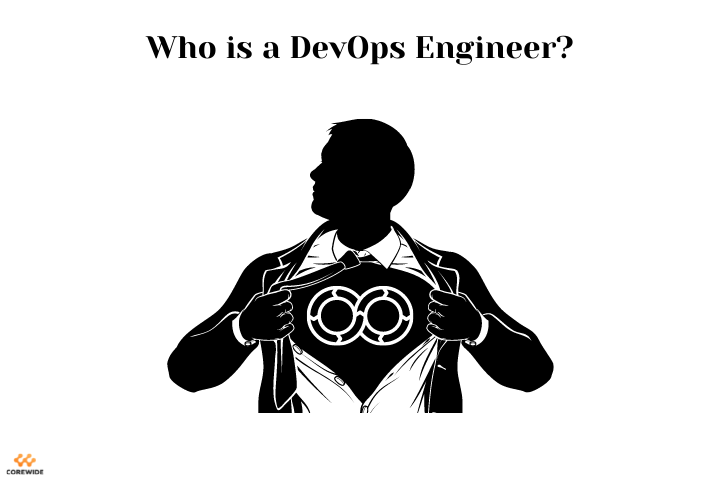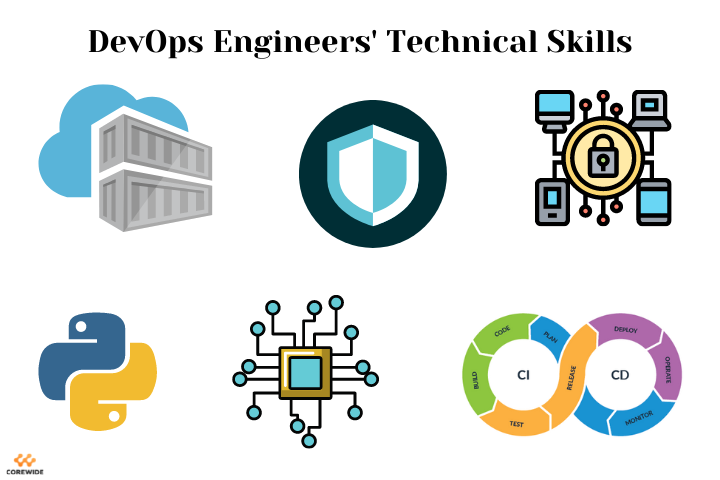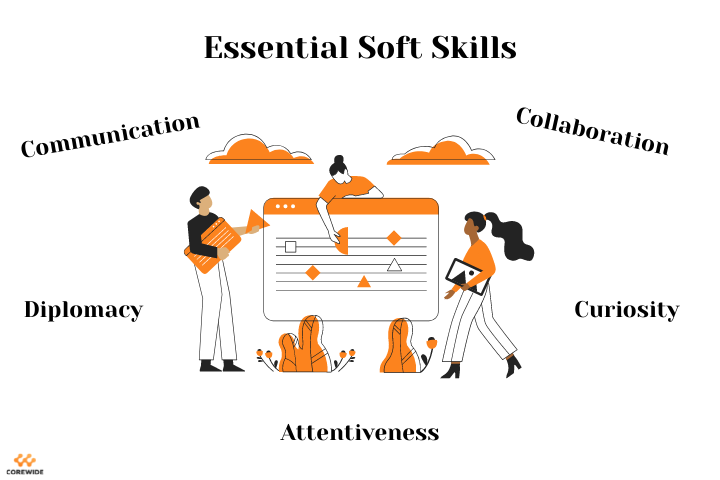How to Start a Career in DevOps?

Starting from fundamentals – what is DevOps? Is it a practice, a person or something completely different? We hasten to assure you that DevOps represents everything listed above. This phenomenon rocked the IT field in the 2000s and consists of methods, tools, and approaches to enhance excellent product development and delivery at higher velocity.
To put it simply, DevOps is a set of recommendations to get reliable hardware, fast CI/CD pipelines, and scalable systems. People often face this term without a clear understanding of it, not to mention mastering DevOps. We aim at breaking the ice and giving you a clear vision of the steps it takes to get one of the best paying jobs in the IT world!
Who is a DevOps Engineer?
You’re already aware that DevOps highlights the importance of collaboration between development and operation teams to reach goals faster and eliminate the silos approach. But who are the notorious DevOps engineers? Where is their team? And do they exist at all?

Organizations interweaving DevOps into the back end area of responsibility claim there is no DevOps as a person in IT. However, we have to admit somebody sets up infrastructure, automates deployment pipelines, and spins the gears of this invisible to end-users IT machine.
Such a position exists, and it’s absolutely unique – DevOps engineers differ from system administrators, QA specialists or support engineers. They form a separate direction representing a perfect mix of all jobs mentioned above – working either in small teams or individually. So, get over it and let us stick to the “DevOps engineer” term.
Common Responsibilities
The typical DevOps Engineers’ duties aren’t strictly regulated – in other words, an employer determines them according to specific business needs or desired load. A realistic overview of their daily tasks looks like this:
- Dealing with infrastructure and ensuring its stability
- Orienting on multiple platforms using a broad range of programming languages
- Optimizing the workload by automating everything that can be
- Setting up or optimizing CI/CD pipelines
- Monitoring and fixing system bugs
- Securing infrastructure, containers, or whatever should be protected
Being a DevOps engineer seems like taking part in a space mission – knowing a lot and applying your talent to guard the whole IT field.
Indeed, it’s a bold choice since one must learn so much, not to mention possessing special soft and hard skills. Why not take a closer look at them?

Essential Technical Skills
- System Administration
Configuring servers, monitoring the system’s health, and setting up efficient alerting become your daily routine and form core responsibilities.
- Cloud & Virtualization
The ability to isolate various systems is vital to running them alongside smoothly. Speaking of clouds, it’s more about choosing a specific combination of services rather than inventing the bicycle and setting up environments from scratch.
- Containerization
Containers allow you to package and isolate the app as well as provide smooth integrations. Docker is a widespread container manager – we recommend starting from it.
- CI/CD
It lets you sustain context and configuration across the pipeline and accomplish the goal of deploying to numerous pieces of infra at different stages. Read more about CI/CD here.
- Source Control Management
These systems track changes and maintain different versions of an application. Git, SVN, Mercurial, and CVS are widespread ones – we encourage you to learn the fundamental aspects of each tool.
- Programming Language
Bad news for all code haters – proper planning of the app’s architecture or choosing the right cloud migration solution is impossible without knowing how to write and read code. Learn at least Python – nobody asks for JS.
- Networking
Numerous networks, protocols, systems and their components build a complex DevOps universe with its patterns and features. And we are convinced that a large set of technologies relies on the networking level that requires a competent DevOps engineer.
- Security
The system leaves itself vulnerable to attack because of faster development and deployment cycles, so DevOps engineers must take account of the security implications of their flows to protect apps from hackers.
Crucial Soft Skills
It’s no secret that with the rise of the COVID-19 pandemic and the switch to the home office, employers started to value soft skills as never before. 59% of companies claim that finding qualified applicants is complex, and 33% name the lack of soft skills as the main reason.

Improving soft skills will surely help you climb the ladder faster – let us, therefore, describe the top skills a DevOps engineer should focus on:
- Communication
If we had to place one skill above all others, it would be this one. Pay attention to the quality of your communication and express your thoughts clearly, being respectful to others.
- Diplomacy
It’s vital to adapt to the circumstances and handle arguments when working with individuals. To become a successful DevOps engineer, you have to develop your diplomatic skills and embrace a team-first mindset.
- Collaboration
Can you work in a team? Are you able to contribute to internal processes, making them more flexible and cross-functional? Congrats, you were born to become a DevOps engineer!
- Attentiveness
Double-checking is a good habit for any employee since even one tiny mistake can result in severe problems and monstrous expenses.
- Curiosity
It killed the cat, but not the DevOps engineer. Being proactive allows you to realize your potential, think outside the box, and apply cutting-edge tech solutions.
Where to Start?
And we’re back to learning. As a newcomer in DevOps, you should be familiar with the primary basis. Pay your attention to the following:
- one OS (we’d prefer Linux)
- one scripting language (Python is an excellent choice, as we said before)
- one cloud computing service (consider widespread Amazon Web Services)
Master this backbone of technologies, and the subsequent learning will be smooth sailing.
The next logical step would be getting down to the CI/CD pipeline. It’s a set of automated processes and tools to build, test, and deploy the code to a production environment anytime.
Establishing an effective pipeline helps create fast, stable and safe systems, using several services concurrently, upgrading the CI/CD workflow quickly, etc.
Increase your knowledge step by step, and do not obsess on a single set of technologies since DevOps practice holds a dozen various activity fields. For instance, it works efficiently studying AWS and GCP in parallel. It isn’t a joke! In this case, learning two things at once ensures you don’t lose previously acquired skills.
As a cherry on top, we’d like to mention self-education. The majority of companies nowadays treasure candidates with extra knowledge or certifications. Pass the courses on Udemy, read profile books, such as Effective DevOps, or monitor educational hubs like Medium and Stack Overflow. The deeper your knowledge is, the more successful you are in action.
Benjamin Franklin said, “Tell me, and I forget. Teach me, and I may remember. Involve me, and I learn.” And we encourage you not to fear trying! Find a job in DevOps, learn on live projects and non-stop tasks because only practice makes perfect.
Summary
We agree that becoming a DevOps engineer seems to be a tricky challenge. Nevertheless, everything is possible if you make an effort and practice about 30 minutes daily (the longer you practice, the faster you get a dream job).
Were you born to explore DevOps? Or are you a recent grad without work experience? No worries, our team is ready to offer you a tech interview!
At Corewide, we value rising talents and help them become true DevOps professionals. Check out our Careers page, and don’t hesitate to send us your CV.
And last but not least: good luck in conquering DevOps!